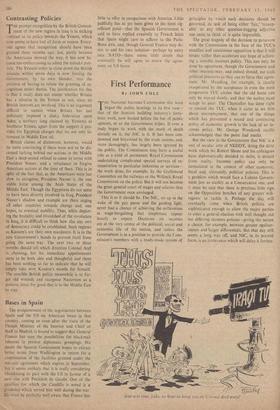Contrasting Policies
liE, prompt recognition by the Biitish Govern- ment of the new regime in Iraq is in striking contrast to its policy towards the Yemen, which now seems to have lost all form or reason. Every- one agrees that recognition should have been granted three months ago; but, partly because the Americans showed the way, it has now be- come too embarrassing to admit the mistake pub- licly. The Yemeni order to close down the British mission within seven days is now forcing the Government, by its own blunder, into the position of having to refuse the granting of re- cognition under duress. The justification for this is that it really does not matter whether Britain has a mission in the Yemen or not, since no British interests are involved. This is an argument difficult to sustain. when Britain has just dubiously imposed a shaky federation upon Aden, a territory long claimed by Yemenis as Southern Yemen, apart from the support it pro- vides for Egyptian charges that we are only in- terested in Middle East oil.
British claims of disinterest, however, would be more convincing if there were not to be dis- cerned lurking behind our actions in the Middle East a deep-seated refusal to come to terms with President Nasser, and a reluctance to forgive American actions at the time of Suez. This is in spite of the fact that, as the Americans were not slow to recognise, President Nasser is the one stable force among the Arab States of the Middle East. Though the Egyptians do not seem to have been directly involved in Iraq, President Nasser's shadow and example are there urging all other countries towards change and, one hopes, to eventual stability. Thus, while deplor- ing the brutality and bloodshed of the revolution in Iraq, it is difficult to think how else any sort of democracy could be established. Such regimes as Kassem's are their own murderers. It is in the new Government's hands to prevent itself from going the same way. The next two or three months should tell which direction Colonel Aref is choosing, but his immediate appointments seem to be both able and thoughtful and there has been nothing so far to indicate that he will simply take over Kassem's mantle for himself. The-sensible British policy meanwhile is to for- get old wounds and recognise Nasserism as a positive force for good that is in the Middle East to stay.


































 Previous page
Previous page